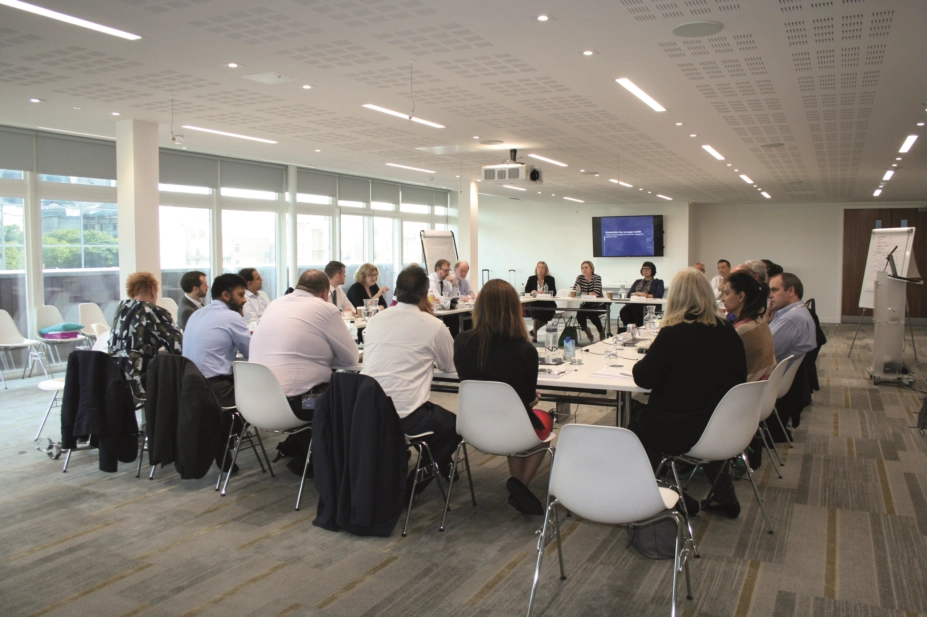
Corrinne Burns / The Pharmaceutical Journal
The English Pharmacy Board met at the London office of the Royal Pharmaceutical Society (RPS) on 5 October 2017. On the agenda were local engagement briefings, and an update on the Community Pharmacy Future project.
Guests at the meeting included Paul Bennett, chief executive of the RPS; Maurice Hickey, project policy pharmacist at RPS Scotland ; Stephen Messham, president of the British Pharmaceutical Students Association (BPSA); Fatema Mamdani, London North West Local Practice Forum (LPF); Christopher Bonsell, West Yorkshire LPF; Ian Simpson, Thames Valley LPF; Malcolm Harrison, senior manager in projects and contract development at Boots UK and Alastair Buxton, head of NHS services at the Pharmaceutical Services Negotiating Committee (PSNC).
Campaign and policy updates
Updating the board on RPS policy and campaigning, Heidi Wright, English Practice & Policy Lead, said that the launch of the antimicrobial stewardship (AMS) campaign at the RPS conference had been successful, with simultaneous publication of the Society’s AMS policy and a quick reference guide.
Wright added that a brief and narrative had been drafted for the RPS’s upcoming mental health campaign, and that these would be circulated to the EPB in the coming weeks.
The Society is continuing to lobby politicians for full read and write access to electronic patient health records.
Local engagement
Gareth Kitson, professional development and engagement lead for England, welcomed three representatives of local practice forums (LPFs) to the meeting: Fatema Mamdani, Christopher Bonsell and Ian Simpson.
Kitson said that by the end of 2017, all LPF bank accounts will have been centralised. The new strategy for local engagement in England will, he said, be created in the final quarter of 2017 and delivered from the start of 2018. By the end of 2017, the first version of a new quarterly newsletter will be circulated to LPFs, and a support day for LPF steering group members will have been devised.
Kitson then presented a paper on how the Board can support local engagement across England. He requested that each board member be assigned an LPF close to their home to interface between the Board and local membership.
Kitson added that local engagement is about much more than LPFs: “it affects policy, lobbying, education, and training. LPFs are the interface between us and our local members”. Paul Bennett added that he was keen for the exec team to be close to local members, too, and asked: “Can we talk about how to align the exec team?”
Professional Development and Support
Updating the board on behalf of the Professional Development and Support (PDS) team, Catherine Duggan, PDS director, said that Claire Thompson had been recruited as deputy chief scientist. The team is also looking forward to the inaugural Winter Summit, to be held in London on 5 December 2017, and Duggan said that 90 abstracts had been submitted ahead of the conference.
Ruth Wakeman, associate director of Professional Standards and Support, said that RPS support tools had been downloaded 33,000 times in quarter three. The most popular tools were the MEP, the POM to P reclassification hub and the Quick Reference Guide to oral contraceptives. Having recently published MEP 41, a responsible pharmacists’ hub and a revalidation and continuing professional development hub, the PDS team were now working on a refresh of Safe and Secure Handling of Medicines, an update to professional standards for hospital pharmacy services, and more Ultimate Guides, including an Ultimate Guide to Prescribing.
Community Pharmacy Future — patient care plans
Malcolm Harrison and Alistair Buxton presented an overview of the Community Pharmacy Future project. Board member Tracey Thornley declared an interest, as she had also been involved with the project.
The project, a collaboration between Boots UK, LloydsPharmacy, Rowlands Pharmacy and Well, was set up in 2011 to develop pharmacy services for patients with long-term conditions. The aims, the board were told, were to improve patient care, provide support for self-care, and generate savings for the NHS.
Four services have been designed under the project: two focused on COPD, one for patients on four or more medicines, and a Pharmacy Care Plan service to develop tailored healthcare plans for patients aged over 50 years. These services supported 1900 patients and more than 120 community pharmacies and identified over £450m of potential cost savings for the NHS, if the services were implanted across all community pharmacies. Evaluation results have been published in
Clinical Pharmacist
and
PLOS One
.
Asked by Paul Bennett how the Board could support this work, Harrison replied that raising awareness of the work would be valuable: “Highlight what we’re doing — if someone says that we need a way to help manage long-term conditions, then tell people that the evidence is there if they need it”. Buxton added that “we need our GP colleagues to advocate for it on our behalf, too”, and suggested that the RPS speak to their RCGP colleagues, and encourage them to make the case for commissioning the project.
- The date of the next English Pharmacy Board meeting was set for 1 February 2018.

